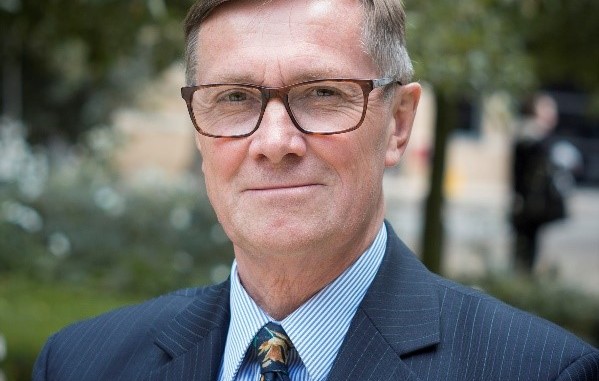
Peter Littlejohns, deputy director of the CLAHRC and public health theme lead recently attended a workshop in Brazil to celebrate the 30th anniversary of the right to health in the country’s constitution. Peter presented his CLAHRC research on fair health care prioritisation and the relevance this might have to Brazil’s universal public health system.
I am writing this blog 39,998 feet above Bilbao in northern Spain, flying home from Sao Paulo. I had been invited to Brazil to give the opening speech at a workshop to celebrate the 30th anniversary of the most significant event in the history of the country’s health care system – the inclusion in 1988 of the right to health in the Brazilian constitution. This breakthrough was the result of a longstanding campaign known as the “Sanitary Movement”. The country’s first universal public health system (the “SUS”) was established only two years later.
The workshop was organised by Octávio Luiz Motta Ferraz, a reader in transnational law at King’s College London and Marta Arretche from the Centro de Estudos da Metrópole (Centre for Metropolitan Studies) at the University of São Paulo. At the workshop, academics from around the world were invited to debate the impact of the inclusion of the right to health in Brazil’s constitution thirty years on. Are there grounds for celebration? How far is there still to go? What are the obstacles and challenges to overcome?
I was there to share my 40 years’ experience of working in the NHS and to describe my CLAHRC-supported research programme on fair health care prioritisation. I soon realised that this was to be quite unlike any meeting that I had participated in before. Many of the speakers were activists in the Sanitary Movement that triggered the establishment of the SUS and they wore their political convictions with pride.

I heard stirring, eloquent speeches on how an improbable consensus had been forged between communists and the Catholic church, which facilitated a bottom-up movement to achieve universal health care. Quite unlike the origins of the NHS, which is mainly credited as the brainchild of Welsh Labour Party politician Aneurin Bevan. But there was to be little celebration of the successes of the SUS from the dais. Instead there was frustration that more had not been achieved and real unease that the current political crisis combined with the ongoing financial crisis might mean that alternative health delivery models involving the private sector would be sought.
Brazil is going through a turbulent period. In the current presidential elections the far-right candidate Jair Bolsonaro was stabbed while canvasing. During my stay, he was in the Albert Einstein Hospital just down the road. Incidentally, he was “saved” by surgery in the local public hospital and was only transferred to the private hospital after his condition stabilised. Brazil has always been a low spender on health care, even during the periods of high economic growth before the crisis in 2014. Since 2000 between 3.3% and 3.8% of GDP has been spent on health. The UK, by comparison, spent 9.8% of GDP on health in 2016. Low public investment is evidence of the low priority of the public health system (reflected by the fact that private expenditure has been consistently more than 50% of total expenditure on health). The recent financial crisis led to austerity measures, which have impacted even further on public health expenditure.
The 30th anniversary of the NHS would have seen academics debating the end of the Labour government led by Callaghan, just three years after the first doctors’ strike in the history of the NHS in 1975. The onset of the Thatcher period saw real concerns over the privatisation of the NHS emerge. These were softened by the purchaser/provider split inspired by Alain Enthoven’s views that you could generate competitive market forces without privatisation. Nearly four decades on, this ultimately flawed concept is likely to be finally laid to rest with the emerging emphasis on “connecteness” and the creation of integrated care systems. This was a point I raised during my presentation – the new configurations in south London are not dissimilar to those dismantled just as I started in public health in 1985. However, whether this diminishes the spectre of “privatisation” of the NHS remains to be seen as the “for profit” organisations could bid to run the new local integrated care systems.

The workshop also addressed health inequalities in Brazil and the so-called “judicialisation of health”. This latter issue is very topical as a debate has ranged between the “right to lifers” and the “fair prioritisers”. The story goes that prioritisers claim that middle classes have used the courts in Brazil to gain their constitutional right to get health care interventions (often expensive cost-ineffective drugs not supported by HTA institutions such as NICE) leading to less money being available for the health system and hence increasing health inequalities. A view vehemently opposed by the “right to lifers”. Both Octavio and I were co-authors on a recent Lancet paper that argues that the fair prioritisers’ argument is sterile. We argue that if appropriate and fair prioritisation processes are in place to reassure the judiciary then both can lead to a healthier population.
In my presentation I emphasised that the public appetite for a fair health service could be maintained by encouraging their involvement in the day-to-day functioning of the system. I described how despite many high-profile failures in the quality of health care in the NHS, people in the UK remain constant in their belief that it should be a universal system, free at the point of entry, and based on need. I also argued that the underlying ideology in today’s NHS (if there was one) was that of basing health decisions at both clinical and policy level on evidence, although politicians continually needed to be reminded of this. I described how CLAHRC South London was a manifestation of this belief, supporting as it does day-to-day health care through a range of methodological approaches.
You can find details of the workshop here: 30-Anos-do-Direito-à-Saúde-no-Brasil-Workshop-September-2018-Programme-August.pdf
Part 1 of Peter’s presentation: brazil_part1_PDF-compressed
Part 2 of Peter’s presentation: brazil_part2_02

Leave a Reply